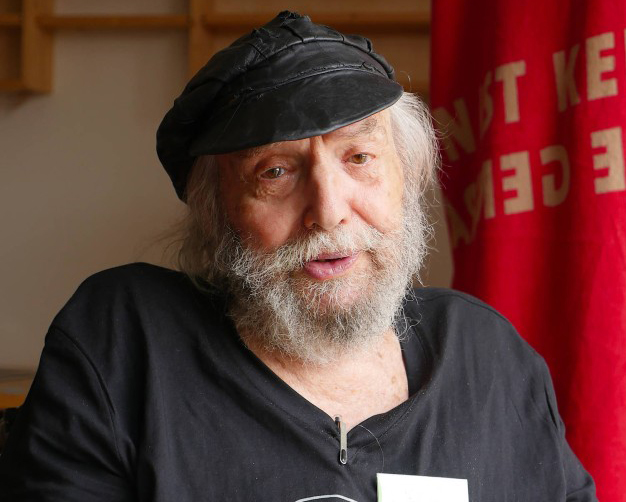Frithjof Bergmann (1930-2021)
Frithjof Bergmann, emeritus professor of philosophy at the University of Michigan, has died.

Professor Bergmann wrote on Nietzsche, Hegel, freedom, and work, and is the author of the 1977 book, On Being Free. He was known for his “New Work” movement, which called for work that upheld the values of autonomy, creativity, meaning, and participation in the community. You can browse some of his writings here.
Bergmann spent most of his career at the University of Michigan, but previously had taught at the University of California, Berkeley, and the University of California, Santa Cruz. He earned his Ph.D. at Princeton in 1959.
UPDATE: The University of Michigan Department of Philosophy has posted a memorial notice for Bergmann.
(via Tad Schmaltz)


I took two or three classes with Frithjof as an undergraduate at Michigan and he was inspirational. Despite their different titles, all of his classes were basically classes in Frithjof, (lots of Nietzsche, with Hegel and Sartre thrown in there, too) but this philosophy-hungry undergraduate ate it up. He was also quite funny. I remember one moment when a student read out a passage from Hegel, asking Frithjof what it meant. Frithjof replied, “Well, *here* Hegel is being obscure.”
He was a student of Walter Kaufman’s at Princeton and regaled us with stories of his time hanging out with Tom Hayden and the other SDSers at Michigan in the 60s. It was even said that he joined in the takeover of the ROTC building, but I never got confirmation of that.
His classes were regularly oversubscribed and when students on the waitlist asked to get in, he would require them to write him a short essay explaining why they wanted to take the course. This dissuaded all but the truly interested and he let most of them in, as I recall.
Condolences to his family and close friends. I treasure my happy memories of time in his classes over thirty years ago.
It was September, 1970, and the class was in thrall, every eye trained on this intriguing, magnetizing professor who sat atop a table, bearded, ponderous, prepared to initiate the fall Philosophy 412 class, the fabled class in philosophy and literature. Bergmann began with a cognitive surprise. “We are always asking what is wrong with everyone else, with society, America. But I want to ask a different question: What is wrong with us?”
He had me and the class right then by turning the philosophical tables, and the readings – Sartre, Camus, Nietzsche, Kafka – and Bergmann’s eye-opening lectures in this and other classes I took with him influenced me profoundly, and have stayed with me over the past half century. Like so many other of his students, I was greatly saddened by his death, for he helped me see things I hadn’t seen before, view ideas in different ways, and imbue life with richer meanings. His theory of freedom as identification, perception as an openness, his ability to seamlessly integrate art and ideas, as well as philosophical treatises and literary masterpieces, his openness, imagination, and…resistance to what is (he was the first professor I had who said we could call him by his first name and broke up those large U of M lectures to meet with students individually), all this opened my mind to ideas and suffused my years as an undergraduate philosophy major at Michigan with meaning and a zest for intellectual life.
Now, a long-time professor myself, I frequently turn to Bergmann’s theory of freedom and the deep existential ideas he taught with such purpose, patience and commitment to really educate his students. I now ask my students to turn from the usual questions to look, inwardly, with a philosophical eye, as he did on that autumn morning in Ann Arbor. Thank you, Frithjof Bergmann, for what you taught, how you taught it, your creative mind, and your deep commitment to education — and how you intellectually enriched of so many students. We are ourselves the better for it, and we identify, perceive as best we can with openness, and love life just a little more because of you.
Richard M. Perloff
Michigan Philosophy (A.B. 1972)
Professor of Communication, Psychology and Political Science, Cleveland State University